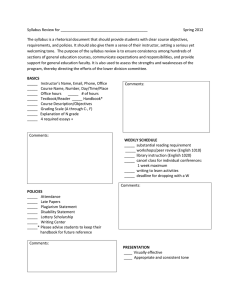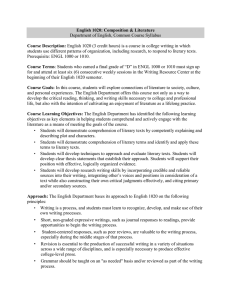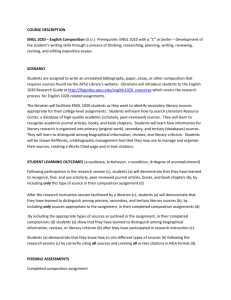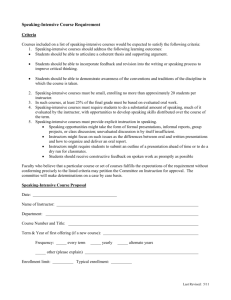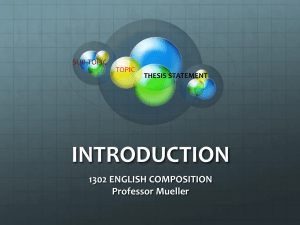6 English 1020: Composition and Literature
advertisement
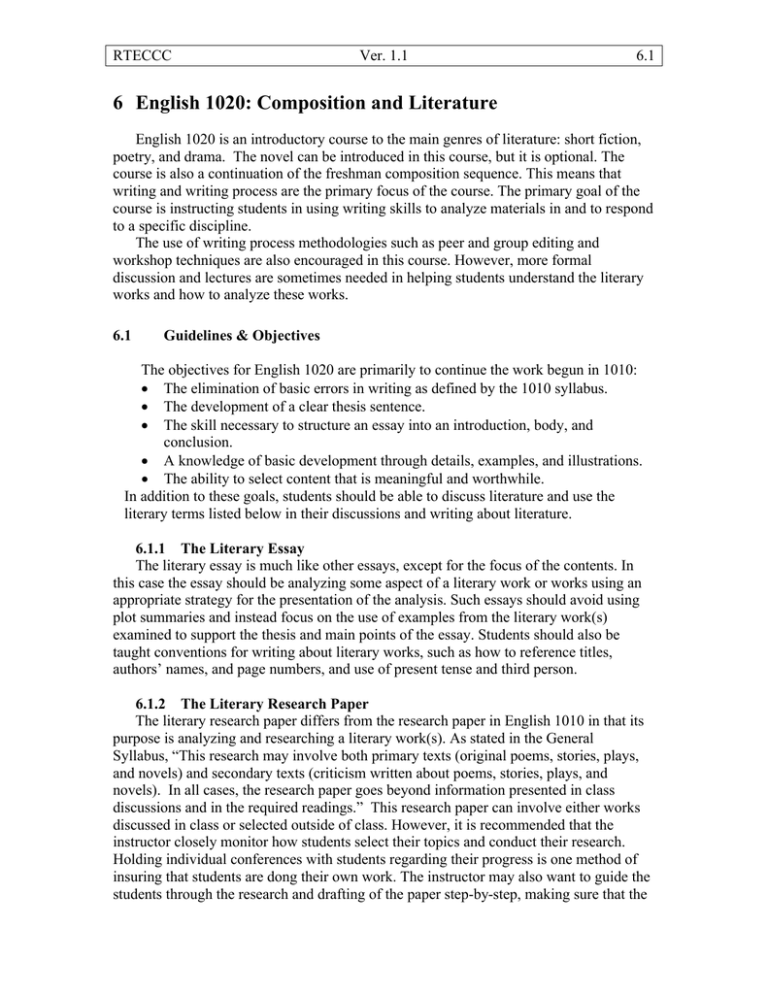
RTECCC Ver. 1.1 6.1 6 English 1020: Composition and Literature English 1020 is an introductory course to the main genres of literature: short fiction, poetry, and drama. The novel can be introduced in this course, but it is optional. The course is also a continuation of the freshman composition sequence. This means that writing and writing process are the primary focus of the course. The primary goal of the course is instructing students in using writing skills to analyze materials in and to respond to a specific discipline. The use of writing process methodologies such as peer and group editing and workshop techniques are also encouraged in this course. However, more formal discussion and lectures are sometimes needed in helping students understand the literary works and how to analyze these works. 6.1 Guidelines & Objectives The objectives for English 1020 are primarily to continue the work begun in 1010: • The elimination of basic errors in writing as defined by the 1010 syllabus. • The development of a clear thesis sentence. • The skill necessary to structure an essay into an introduction, body, and conclusion. • A knowledge of basic development through details, examples, and illustrations. • The ability to select content that is meaningful and worthwhile. In addition to these goals, students should be able to discuss literature and use the literary terms listed below in their discussions and writing about literature. 6.1.1 The Literary Essay The literary essay is much like other essays, except for the focus of the contents. In this case the essay should be analyzing some aspect of a literary work or works using an appropriate strategy for the presentation of the analysis. Such essays should avoid using plot summaries and instead focus on the use of examples from the literary work(s) examined to support the thesis and main points of the essay. Students should also be taught conventions for writing about literary works, such as how to reference titles, authors’ names, and page numbers, and use of present tense and third person. 6.1.2 The Literary Research Paper The literary research paper differs from the research paper in English 1010 in that its purpose is analyzing and researching a literary work(s). As stated in the General Syllabus, “This research may involve both primary texts (original poems, stories, plays, and novels) and secondary texts (criticism written about poems, stories, plays, and novels). In all cases, the research paper goes beyond information presented in class discussions and in the required readings.” This research paper can involve either works discussed in class or selected outside of class. However, it is recommended that the instructor closely monitor how students select their topics and conduct their research. Holding individual conferences with students regarding their progress is one method of insuring that students are dong their own work. The instructor may also want to guide the students through the research and drafting of the paper step-by-step, making sure that the RTECCC Ver. 1.1 6.2 students are not inadvertently misusing sources. Instructors may also want to require students to turn in photocopies of source materials from which direct quotes or paraphrased information is drawn. 6.1.3 Examinations Instructors may give examinations in 1020 if they wish. While 1020 is intended to be a writing intensive course, instructors may wish to give short quizzes to insure that students are reading materials or test student’s knowledge of terminology. Midterm and final exams, if given, should incorporate writing components. 6.2 Texts and Literature Supplements The required text for English 1020 is the handbook required for all English classes: Hacker, Diane. The Bedford Handbook. 4th ed. New York: Bedford, 1998. Normally, instructors have their choice of texts for English 1020. However, the current default text ordered for courses is: Abcarian, Richard, ed. Literature: Reading and Writing the Human Experience. (current edition). Desk copies are available from the Director of Composition. RTECCC Ver. 1.1 6.3 6.3 Literary Terms The terms listed below are to be covered in all English 1020 courses. Understanding these concepts is necessary to the student’s ability to discuss and analyze literature. Thus, instructors should make an effort to introduce these terms to students in their discussions of literature. General allusion archetype cliché conflict diction drama explication genre 7alitry Poetry alliteration blank verse free verse lyric meter personification simile rhyme scheme Fiction antagonist magical realism narrator omniscience point of view prose protagonist realism Drama catharsis comedy tragedy RTECCC Ver. 1.1 6.4 the student to accompany the General Syllabus. Copies of the General Syllabus to disperse to classes can be obtained from the Department Secretary. English 1020: Composition and Literature GOALS AND COURSE DESCRIPTION: English 1020 is the second semester of the freshman composition sequence. Students in the course have successfully completed English 1010. The course attempts to reinforce the skills and goals of 1010: • The elimination of basic errors in writing as defined by the 1010 syllabus • The development of a clear thesis sentence • The skill necessary to structure an essay into an introduction, body, and conclusion • A knowledge of basic development through details, examples, and illustrations • The ability to select content that is meaningful and worthwhile In addition to being a composition course, English 1020 also introduces the student to several types of literature: poetry, drama, and fiction. The course combines the writing component and the literature component by having the student write about the literature assigned and discussed in class. APPROACH AND REQUIREMENTS: In order to achieve these goals, students will read and discuss literature from the major genres of poetry, fiction, and drama. An informal or a formal approach to the course may be taken. If the course is conducted informally, students may be asked to form small groups for discussion of the literature and for peer review of drafts; to respond to prompts through short, non-graded expressive writing; to keep portfolios or academic journals; and to develop topics for essays and the research paper from journal responses. If the course is conducted formally, the written work and papers may be handled more traditionally, through lectures on the readings and topics assigned by the instructor. Students will be asked to produce six to eight essays of 500 or more words and a research paper of 6-10 type-written pages. The course will include some in-class and some out-of-class writing. In all sections revisions will be required for some papers, but student-initiated revision is encouraged throughout the semester. EMAIL AND WORD PROCESSING: All students are required to obtain an email account. For a more detailed description of how email may RTECCC 8. Ver. 1.1 6.5 Ability to construct a bibliography of all sources, presented in proper MLA style. Students should regard the research paper, not as a dry academic exercise, but rather as a chance to pursue a topic that truly has captured their interest, about which they want to learn more. EVALUATION: Progress in this course will be evaluated on the basis of required reading and writing assignments, with emphasis given to assignments completed during the latter part of the semester. To do well in this course, students must demonstrate an energetic commitment to completing all the required work. INTELLECTUAL HONESTY: Passing off any other person's work as one's own, whether in essays or in the research paper, constitutes plagiarism, a violation of intellectual honesty. Since students will be given precise instructions on the most effective ways to document information, there should be no problem acknowledging sources and avoiding plagiarism. Any assignment that gives evidence of not being completely one's own work will receive the grade of "F." ATTENDANCE: The university attendance requirement for this course will be strictly followed. More than six absences if the class meets three time a week, or four absences if the class meets twice a week, will result in the grade of "FE." RTECCC 6.5 Ver. 1.1 6.6 Sample Syllabus As mentioned above, instructors must supply a supplemental syllabus to accompany the General Syllabus. An example is provided below. Note that this is but one example of a syllabus for this course. Instructors are invited to deviate from this syllabus as needed to best represent the methodology they wish to present to the class. English 1020-06. Composition and Literature. Fall 2000 204 Xavier South 9:00 – 9:50 MWF (Syllabus issued: 17 August 2000) Instructor: Dr. Jane Deaux Office: Adm. Annex, room 213A, ext. 5245 Office Hours: 10am-12pm MW; 3pm-5pm TR; and by appointment Email: jdeaux@xula.edu Course Description: English 1020: Composition and Literature (3 credit hours) is designed to reinforce skills learned in English 1010 in addition to introducing students to various genres of literature. As a composition-based course, written responses will be the primary sources of learning. The instructor will provide direction and structure, but students will propel class discussions through formal and informal responses to texts. Student writing will by a part of and catalyst for class discussions. Prerequisites: Successful completion of English 1010. Materials: : (This may include any materials you think the students need for the course besides texts, such as notebooks, journals, diskettes, folders, etc.) Texts: The Bedford Handbook. Diana Hacker. 5th ed. Bedford, 1998. Literature: Reading and Writing The Human Experience Richard Abcarian, ed. 7th ed. Like Water for Chocolate Course Objectives: (While there are general goals that pertain to all English 1020 classes as stated in the General Syllabus, the instructor may add to these, as seen below.) • Students will discuss and write about literary works from cultural, social, historical, political, and thematic perspectives. • Students will respond to literary works using the techniques of analysis, evaluation, and comparison/contrast. • Students will learn to give short oral presentations. • Students will keep a journal to record their reactions to literature. • Students will complete a research project using a process that requires library and computer resources, and MLA documentation. Writing Assignments: (The type of writing assignments an instructor plans on using should be explained to the student. Instructors use different types of assignments in 1020 depending on if they want to use a formal approach in which they require formal essays, or a more informal approach in which case they might use a combination of short responses which might develop into more formal essays or journal writings that do the same.) RTECCC Ver. 1.1 6.7 Oral Reports: (These also work well with 1020 classes and can lead to class discussion. Assessment and guidelines are the instructor’s discretion.) Research Paper: (How research papers are handled is also up to the instructor. They may be one of the required formal essays that has been expanded into a longer paper or a separate project. Of course, the research paper must be literary in nature.) Midterm and Final Exams: (The inclusion of examinations in 1020 is up to the instructor.) Grading: (This section should clearly explain the grading system, especially how you plan to incorporate different assignments into the assessments and the weights of different types of assignments. An example follows.) I follow the university standard for grading : A - excellent, B - above average, C - average, D - below average, F - failure. Each letter grade is given points for averaging grades: A - 4 points, B - 3 pts., C - 2 pts., D - 1 pt., F - 0 pts. I do place pluses and minuses (+/-) on grades (ex., B- or D+) to indicate the strengths and weaknesses of grades, but these do not affect the point values of grades. In the beginning of the semester I base my grading primarily on the students' organization and development of ideas during the writing process. Your midterm grade will be based on graded assignments completed by midterm. Your final grade will be based on all the assignments: Essay grades 40% Research grades 20% Response Papers 20% Oral Reports 20% Attendance: Attendance for this course follows the university standard for all 1000 level courses. You are allowed six (6) absences regardless of illness, approved travel, accident, etc. If you exceed these six absences, you receive an "FE" (failure for excessive absences) in the course. Tardies are counted as absences unless you tell me at the end of class that you were late. Habitual tardiness will receive one warning. Afterward, such tardies will remain absences. Classroom Conduct: (While this section shouldn’t be necessary, some instructors find it necessary for freshmen.) 1. Be respectful of who is talking at all times. 2. Always be prepared for class. 3. Avoid rude behaviors such as reading materials from another class, sleeping, placing your head on your desk, wearing hats that cover your eyes, wearing sunglasses, or eating meals in class. 4. Turn off your beepers and phones before entering class. Should you be unable to meet these expectations, you will be dismissed from class and marked absent. Deadlines: (Many instructors like to give instructions concerning meeting deadlines and penalties for missing deadlines, such as dropping the assignment a letter grade for each day the assignment is late, or emphasizing that assignments are due at the beginning of class and are considered late if received afterwards.) Make-Ups: You are responsible for everything you miss in this class. You must speak with me about missed deadlines immediately after returning to class because of absence. I am not responsible for reminding you of your obligations. Cheating/Plagiarism: The university has stringent policies concerning cheating and plagiarism. Students caught cheating or plagiarizing will receive an "F" for the course. Plagiarism is when someone tries to pass off someone else's work, writing, ideas, etc., as their own. For this course, cheating is when a student communicates with another student or looks at another student's work during the course of an examination without the instructor's permission. RTECCC Ver. 1.1 6.8 Course Content: The schedule below is general and based on week-by-week goals for the course. Please be aware that the schedule may change depending upon timing conflicts and the students' abilities to process material. (page numbers are examples only) WK 1 Intro to Course; Response Papers explained; preliminary writing. WK 2 Eveline (4-10); A Rose for Emily (315-20); Roman Fever (255-63). WK 3 Writing about plot and setting Arranging ideas WK4 Response paper 1 due; Presentations WK 5 Poetry Unit (selections given at this time) WK 6 Writing About Poetry; Poetry presentations WK 7 MIDTERM; Response paper 2 due. WK 8 Discussion of Research paper; Drama Unit. A Raisin in the Sun WK 9 A Raisin in the Sun WK 10 A Raisin in the Sun Writing about Drama WK 11 Presentations; Response paper 3 due; Research paper discussion. WK 12 Intro to the Novel; Like Water for Chocolate WK 13 Like Water for Chocolate. WK 14 Like Water for Chocolate; Writing about longer works. WK 15 Presentations; Response paper 4 due. WK 16 Review for Final; Final research paper due.
